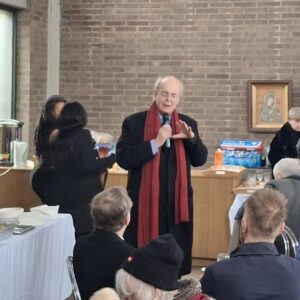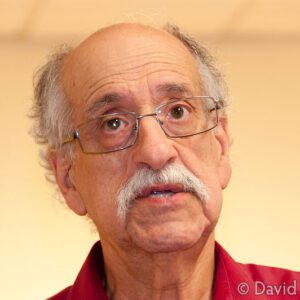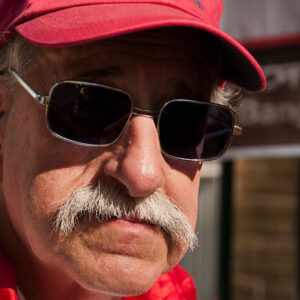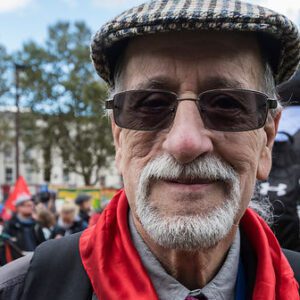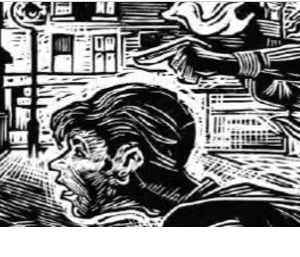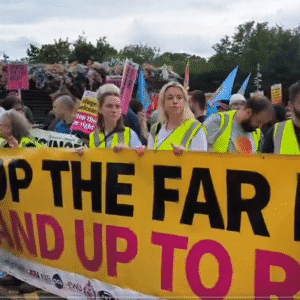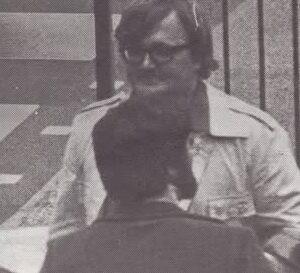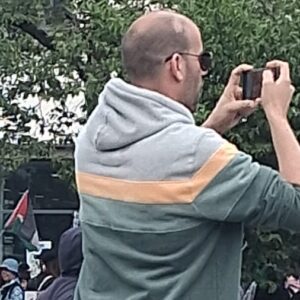Dozens gathered yesterday to bid farewell to Gerry Gable, Searchlight’s founder, whose funeral was held in London. People came from across the country and the anti-fascist world to pay their respects at a service which reflected Gerry in its wonderfully broad, ecumenical, united character. Dylan fan The service opened with the sound of Bob Dylan […]
Trade union tribute to Gerry Gable
The RMT trade union has just published this tribute to Searchlight’s founder, publisher and editor emeritus, Gerry Gable.
Searchlight, Gerry Gable and ‘Maggie’s Militant Tendency’ – setting the record straight
In 1984 BBC Panorama made a programme called Maggie’s Militant Tendency, which investigated far-right extremism in the Conservative Party. It was the subject of successful libel action by Tory MPs Neil Hamilton, Gerald Howarth and others, and led to a major crisis for the BBC. The Director General, Alasdair Milne, lost his job over it. […]
Gerry Gable (1937-2026)
It is with the greatest sadness that we have to announce that Searchlight’s founder, Gerry Gable, has died at the age of 88. He had been in frail health for some time, but a recent hospital admission proved too much and he died peacefully last night. Gerry was one of the most important figures in […]
Mr Christopher Chandler
In an article published on 19 November, entitled ‘Matthew Goodwin and Reform UK’s push into British campuses’, we referred to connections between Matthew Goodwin and the Legatum Institute. The Institute is funded by the Legatum Foundation, itself controlled by Christopher Chandler and his partners at the Legatum Group. In the article we referred to allegations […]
What’s happened to our X account?
Yesterday we were informed that our X account has been locked. Apparently someone has taken offence and reported us for “hateful conduct”. The issue, apparently, is the banner and logo at the top of the page, a famous woodcut by anti-racist artist Ken Sprague, depicting the murder of Kelso Cochrane in Notting Hill in 1959. […]
Obituary: Sir Geoffrey Bindman (1933-2025), an extraordinary lawyer and a friend of Searchlight
Everyone at Searchlight was deeply saddened to learn of the death of Sir Geoffrey Bindman, who passed away on 4 November. Geoffrey was a towering figure in British legal and human rights circles. Over a career spanning more than six decades, he championed civil liberties, racial equality, and justice for the marginalised, leaving an indelible […]
The lies and lies of the ‘Pink Lady’ child abuser
Gemma Mattinson, the vile ‘save our kids’ Pink Lady with convictions for child cruelty, is a liar. She’s posted a sickening, exculpatory defence of the crimes that got her jailed, minimising the seriousness of the cruelty inflicted on the children she had in her care. This is what she says: So, just to be clear, […]
Did prodigal son ‘Tommy’ leave Rikki waiting at the altar?
It was something we awaited with considerable anticipation. Ten days ago, ‘Tommy Robinson’ announced online that the following Sunday (ie three days ago) he would be going to church. That’s right, ‘Tommy Robinson’ in church. “For the first time in years”, he told us. And not just any church, but his far-right mate Rikki Doolan’s […]
Historic fascist turnout heralds dangerous times
There is just one major takeaway from yesterday’s Tommy Robinson-organised ‘Free Speech’ festival in London – 110,000 supporters of a far-right, racist agitator marched through London in the biggest public demonstration of fascism ever seen in this country. Just think how often we refer back proudly to over 100,000 people coming out to support the […]
Correction
On Saturday we published an article which said that Tommy Robinson’s close collaborator, Danny Tommo, was seen inciting violence earlier in the day at Robinson’s London demonstration. This was based on a contemporaneous account. However, having reviewed video evidence published online since we have concluded that this claim is not supported by the evidence now […]
Epping sets anti-racists a challenge we cannot shirk
In Epping, organised fascists and their racist supporters have scored a notable victory over the last couple of weeks. The situation was not turned around by yesterday’s creditable anti-racist turnout but maybe a line has been drawn, and a moment signalled when the real, hard work of winning hearts and changing minds in that divided […]
Epping this Sunday – anti-racists must nip far-right violence in the bud
On 7 August last year, in response to direct fascist threats of violence against organisations helping migrants and asylum seekers, tens of thousands of anti-racists turned out to physically protect those organisations. It was a phenomenal show of strength and helped put an end to a week of horrendous racist violence. Searchlight wrote at the […]
Exclusive: Homeland defector exposes ugly truth behind ‘sensible nationalism’
Alex Bramham has always been on the right of politics. Last year he stood in the General Election for the right-wing Social Democratic Party. Before that he had been active in the Conservative Party in Manchester where he ran several times as a council candidate. He has also been a prominent activist in gay politics, […]
Apology and correction
Last Sunday (22 June) we ran an article about right-wing photographers who were taking pictures of people attending left-wing or anti-fascist demonstrations. Two of those pictured, including the person captioned number 2, have contacted us to say they have no involvement with the far right. Others have contacted us on their behalf. We are happy […]
Correction:
Yesterday, in an article entitled ‘Reform suspends branch chairman – for reporting concerns to police’, we wrote that the election agent for Reform UK in the recent elections to Exeter City Council was Mr Robert Sheridan, a barrister and husband of former UKIP and Brexit Party activist Alison Sheridan. Mrs Sheridan is now a Conservative […]
UKIP licks its wounds and ponders an uncertain future
One of the happy consequences of the recent local council elections – and there weren’t many – is that it seems to have persuaded UKIP Leader Nick Tenconi to keep his mouth shut for a while. In fact, there has been pretty much radio silence from UKIP HQ since the results came rolling in. Utter […]
‘Treachery’ to stop terrorism say nazi ‘intellectuals’
Those self-styled ‘nazi intellectuals’ at Heritage and Destiny magazine are very unhappy that we have paid tribute to Peter Marriner, the Searchlight mole in the far right for many, many years, who has just died. “Death of a traitor” trumpets their article, where they denounce as ‘treachery’ Peter’s success in stopping terrorist attacks. They write: […]
So why was Charlie Veitch trying to photograph everyone on May Day march?
Last week, YouTube ‘film maker’ and blogger Charlie Veitch was seen in Manchester joking and cosying up to some the most vile fascists in the UK. This weekend he was out in Manchester again, but this time he was spotted at a May Day worker’s rally in the centre of the city, where hundreds of […]
Remembering the Admiral Duncan attack
Today, on the anniversary of nazi David Copeland’s third and most deadly nail bomb attack on London in 1999, we remember his victims; those who died in the Admiral Duncan pub in Soho and the many more injured there, and in Brick Lane and Brixton. 25 years ago, Searchlight worked with BBC Panorama to investigate […]
